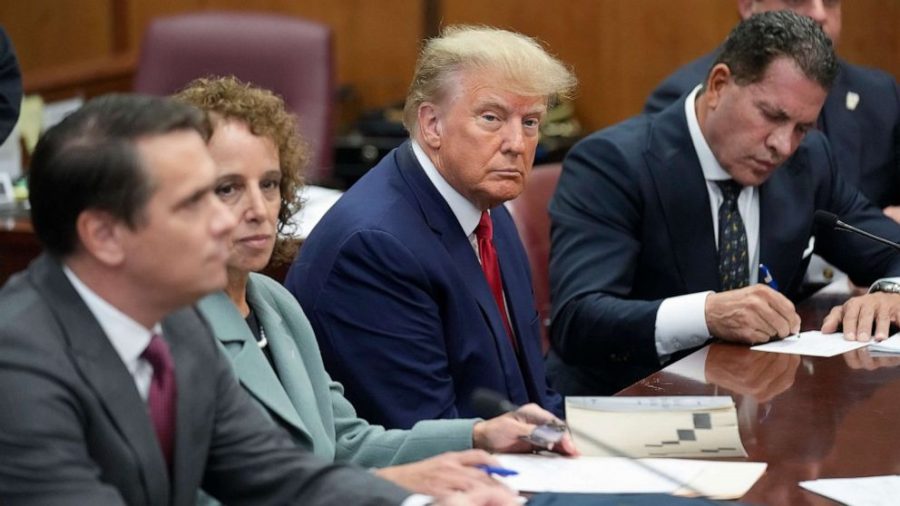Donald Trump, the former president of the United States, was arrested on Tuesday in New York. He is the first president to lose the popular vote twice, the first federal official to be impeached twice and is now the first president – current or former – to face criminal charges.
“There is no precedent to give us any kind of guidelines on this case,” John Kincaid, a government & law professor, said. “This is so unusual.”
Trump, who is currently in the midst of his third bid for the presidency, was charged with 34 felony counts of falsifying business documents. He pled not guilty to all of the charges.
Prosecutors accuse Trump of violating state and federal law by declaring hush money as regular payments to his attorney in tax and business records throughout 2017. While such conduct would typically earn a defendant misdemeanor charges, Trump’s alleged use of the hush money to influence the 2016 election amounted to a campaign contribution, according to prosecutors, causing the charges to be elevated to felonies.
“The question is whether it can be construed as a campaign contribution to begin with,” Kincaid said. “It wasn’t a direct campaign contribution to the campaign.”
Other legal wrinkles exist in Trump’s criminal case. Prosecutors are expected to call former Trump attorney Michael Cohen, a convicted felon, as their star witness. Additionally, prosecutors’ attempts to tie Trump’s conduct to federal crimes in state court have raised the eyebrows of analysts.
Kincaid explained that the state of New York has the authority to try federal crimes through a concept known as concurrent jurisdiction but that the indictment solely alleged violations of state law – it merely implied Trump sought to violate either state or federal law in the course of falsifying documents.
“It is not legally clear … that [prosecutors] can claim an alleged attempt on Trump’s part to commit a federal crime in order to convict Trump of a criminal offense under state law,” Kincaid wrote in a follow-up email. “This is an unprecedented legal strategy. So, the key question is whether the judge should dismiss the indictment as improper.”
Trump, for his part, called for the case to be thrown out in a speech given after his arraignment, citing left-leaning pundits who have criticized the case as fickle. In the same speech, he called the district attorney bringing the case against him an “animal” and accused the judge of hating him and having a “Trump-hating wife and family.”
Days before Trump’s court appearance, he warned of “potential death & destruction” in a social media post, a tactic that some say is intimidatory.
“That’s not the response of somebody who understands the importance of … accountability in a government,” Kaitlin Ahern, the president of the College Democrats, said.
Representatives for the College Republicans could not be reached for comment.
Republicans have largely closed rank around the former president. Florida Governor Ron DeSantis, seen as a Trump rival in the 2024 Republican primary, signaled last month that he would not sign extradition paperwork for Trump, a Florida resident, should he refuse to surrender. Congressional Republicans have similarly sought to compel testimony from Alvin Bragg, the New York County District Attorney, a move that the district attorney lambasted as an “unlawful incursion” on the legal process.
Representative Susan Wild, who represents Easton in the House of Representatives, sided with Bragg, a Democrat, on the matter.
“Congress should not insert itself into the course of this case when there are very real issues our constituents face that our time would be better spent addressing,” Wild, a Democrat, wrote in an email. “We should let the legal system do its job and focus on doing our own.”
Trump has also claimed that his status as a former president should shield him from prosecution. Bruce Murphy, a professor of government & law, said that the Supreme Court case Clinton v. Jones opened the door for Trump to face charges.
“That was a case in which the question was could a trial go forward in Arkansas dealing with an incident that may or may not have been involving [alleged mistress of Bill Clinton’s] Paula Jones,” Murphy, a Supreme Court scholar, said. “[Justice] John Paul Stevens, who was writing the opinion, said, ‘Why not? No person is above the law.’”
Elisabeth Seidel ’26 contributed reporting.






































































































